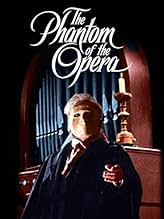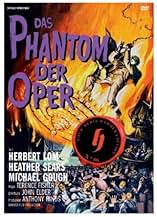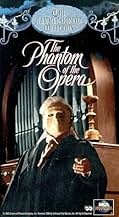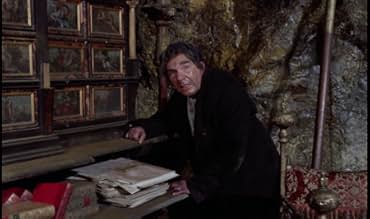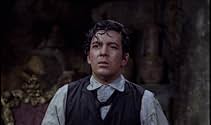IMDb-BEWERTUNG
6,4/10
4020
IHRE BEWERTUNG
Ein säurernarbiger Komponist lässt seinen Zwergenhelfer einen Opernsänger in sein Londoner Kanalversteck bringen.Ein säurernarbiger Komponist lässt seinen Zwergenhelfer einen Opernsänger in sein Londoner Kanalversteck bringen.Ein säurernarbiger Komponist lässt seinen Zwergenhelfer einen Opernsänger in sein Londoner Kanalversteck bringen.
- Regie
- Drehbuch
- Hauptbesetzung
- Auszeichnungen
- 1 Nominierung insgesamt
Miriam Karlin
- Charwoman
- (as Miriam Carlin)
Empfohlene Bewertungen
This was one of the best, but it really bothered me that it strayed so far from other versions. It takes place in Victorian London rather than Paris, and the Phantom has a totally different death scene at the end. What happened to the famous "Chandelier" scene? Christine Charles instead of Dae?? Anyway, a very good movie. I'd rate this about an 8 out of 10. Those sets in the underground certaintly look like the original sets from 1925!.
Gaston Leroux's classic novel, "The Phantom of the Opera", is definitely one of the most famous and influential Gothic stories of horror and mystery ever written, and its main character, the Phantom, an icon of the Gothic horror literature. The novel's enormous popularity has resulted in many different adaptations, such as the 1925 silent film starring Lon Chaney, or more recently, the musical play by Andrew Lloyd Webber; works where the story of the mysterious figure that haunts the Palais Garnier has been explored in many different and interesting ways. Given the potential of the story, it's not a surprise that the legendary production company, Hammer Films, decided to make its own version of the story, written and produced by Anthony Hinds and under the direction of Hammer's best filmmaker Terence Fisher.
Hammer's version offers many changes to Leroux's novel, the most noticeable one being that the movie is set in London instead of Paris. In this movie, producer Harry Hunter (Edward De Souza) and theater owner Lattimer (Thorley Walters) are working with famous composer Lord Ambrose d'Arcy (Michael Gough) to put d'Arcy's new opera, "Joan of Arc", on stage. However, they are facing trouble as a mysterious figure known only as "the Phantom" (Herbet Lom) is wrecking havoc by sabotaging the essays and committing a series of murders. The Phantom's actions make the lead singer of the opera to quit, but soon the producers find a replacement in the figure of Christine Charles (Heather Sears), a young singer with a beautiful voice. However, the Phantom is still there, and he gets a sudden dangerous interest in the new singer.
Written by producer Anthony Hinds (as usual, under the pen name of John Elder), this version of the Phantom's story is a complete re-imagining of Leroux's story; but while different, it remains surprisingly faithful to the novel's essence by keeping true to the horror and mystery elements of the story. The Phantom here is a sympathetic and human figure, pretty much like the one presented in Universal's 1943 adaptation; however, Hinds makes his Phantom an anti-hero, and together with the addition of Lord d'Arcy as another "villian" gives the movie a very different tone to that previous version. As in most of his works, Hinds plays with the tragic aspects of horror, slowly taking the story to its shocking (albeit rushed) ending.
Director Terence Fisher makes an excellent job at bringing this Phantom to life with his usual lavish look and with a nice touch of class and elegance. Hammer horror movies are known for being violent and gory, but this movie is different in the sense that focuses on atmosphere and mood rather than on scares. In fact, while the Phantom has a striking appearance (courtesy of Roy Ashton's excellent make-up), Fisher subtle and restrained take makes him less scary, using the haunting presence of his "monster" to increase its tragedy, instead of his monstrosity. While the budget was low, Fisher makes great use of his resources to create a wonderful moody film that keeps the novel's captivating atmosphere like few adaptations have done.
Another element that makes "The Phantom of the Opera" an unusual Hammer film is the fact that few Hammer regulars appear in the cast. However, this by no means is a sign of unworthy performances. Herbert Lom is excellent as the Phantom, a difficult role as the mask in Fisher's version covers completely the actor's face, forcing him to use only his voice in his delivery. Lom is no Chaney of course, but easily ranks as the second best performance as the character. Edward De Souza's character is an equivalent of the novel's Raoul, but of course, with a big number of changes. De Souza's Harry Hunter is daring and witty, and he carries the film with dignity as the character in charge of solving the mystery of the Opera House. Heather Sears makes a believable Christine with her innocent looks and an excellent lip sync for the singing scenes. Finally, Michael Gough steals the movie, making a terrific performance as the villainous Lord d'Arcy; easily, the highlight of the movie.
It's easy to see why this version of "The Phantom of the Opera" is not as celebrated as other Hammer films. The movie lacks some of the studio trademarks, as Hinds and Fisher decided to go for a different approach in this film. Also, the focus on atmosphere and mystery instead of direct horror make the film to look "different" or atypical, however, it's this restrained approach what in the end makes it one of the best (and ironically most faithful) adaptations of the story. At first sight it feels as if the Hammer magic was lost, but in the end, this is far from the worst that the legendary studio has done, and in all fairness, it's as good as their best films. Finally, a last minor quibble is that, like the 1943 film, it uses many overlong Opera scenes that while remarkably well done, add little to the plot and easily could had been replaced with a longer conclusion.
"The Phantom of the Opera" is not really a favorite among Hammer fans, but it's a really classy take on the iconic story of the disfigured genius that roams the Opera house. It's very different to other versions, but it keeps the spirit of Leroux's novel like no other film has done (with the exception of 1925 silent film). This underrated film really deserves a chance to be better known. 7/10
Hammer's version offers many changes to Leroux's novel, the most noticeable one being that the movie is set in London instead of Paris. In this movie, producer Harry Hunter (Edward De Souza) and theater owner Lattimer (Thorley Walters) are working with famous composer Lord Ambrose d'Arcy (Michael Gough) to put d'Arcy's new opera, "Joan of Arc", on stage. However, they are facing trouble as a mysterious figure known only as "the Phantom" (Herbet Lom) is wrecking havoc by sabotaging the essays and committing a series of murders. The Phantom's actions make the lead singer of the opera to quit, but soon the producers find a replacement in the figure of Christine Charles (Heather Sears), a young singer with a beautiful voice. However, the Phantom is still there, and he gets a sudden dangerous interest in the new singer.
Written by producer Anthony Hinds (as usual, under the pen name of John Elder), this version of the Phantom's story is a complete re-imagining of Leroux's story; but while different, it remains surprisingly faithful to the novel's essence by keeping true to the horror and mystery elements of the story. The Phantom here is a sympathetic and human figure, pretty much like the one presented in Universal's 1943 adaptation; however, Hinds makes his Phantom an anti-hero, and together with the addition of Lord d'Arcy as another "villian" gives the movie a very different tone to that previous version. As in most of his works, Hinds plays with the tragic aspects of horror, slowly taking the story to its shocking (albeit rushed) ending.
Director Terence Fisher makes an excellent job at bringing this Phantom to life with his usual lavish look and with a nice touch of class and elegance. Hammer horror movies are known for being violent and gory, but this movie is different in the sense that focuses on atmosphere and mood rather than on scares. In fact, while the Phantom has a striking appearance (courtesy of Roy Ashton's excellent make-up), Fisher subtle and restrained take makes him less scary, using the haunting presence of his "monster" to increase its tragedy, instead of his monstrosity. While the budget was low, Fisher makes great use of his resources to create a wonderful moody film that keeps the novel's captivating atmosphere like few adaptations have done.
Another element that makes "The Phantom of the Opera" an unusual Hammer film is the fact that few Hammer regulars appear in the cast. However, this by no means is a sign of unworthy performances. Herbert Lom is excellent as the Phantom, a difficult role as the mask in Fisher's version covers completely the actor's face, forcing him to use only his voice in his delivery. Lom is no Chaney of course, but easily ranks as the second best performance as the character. Edward De Souza's character is an equivalent of the novel's Raoul, but of course, with a big number of changes. De Souza's Harry Hunter is daring and witty, and he carries the film with dignity as the character in charge of solving the mystery of the Opera House. Heather Sears makes a believable Christine with her innocent looks and an excellent lip sync for the singing scenes. Finally, Michael Gough steals the movie, making a terrific performance as the villainous Lord d'Arcy; easily, the highlight of the movie.
It's easy to see why this version of "The Phantom of the Opera" is not as celebrated as other Hammer films. The movie lacks some of the studio trademarks, as Hinds and Fisher decided to go for a different approach in this film. Also, the focus on atmosphere and mystery instead of direct horror make the film to look "different" or atypical, however, it's this restrained approach what in the end makes it one of the best (and ironically most faithful) adaptations of the story. At first sight it feels as if the Hammer magic was lost, but in the end, this is far from the worst that the legendary studio has done, and in all fairness, it's as good as their best films. Finally, a last minor quibble is that, like the 1943 film, it uses many overlong Opera scenes that while remarkably well done, add little to the plot and easily could had been replaced with a longer conclusion.
"The Phantom of the Opera" is not really a favorite among Hammer fans, but it's a really classy take on the iconic story of the disfigured genius that roams the Opera house. It's very different to other versions, but it keeps the spirit of Leroux's novel like no other film has done (with the exception of 1925 silent film). This underrated film really deserves a chance to be better known. 7/10
"The Phantom of the Opera" by Hammer is a dramatic version directed by Terence Fisher. The screenplay shows the phantom as a poor composer that is stolen by the arrogant and corrupt Lord Ambrose D'Arcy, who is the real villain of the story. The sets and costumes are magnificent associated to great performances in one of the best films of the famous story by Gaston Leroux. My vote is seven.
Title (Brazil): "O Fantasma da Ópera" ("The Phantom of the Opera")
Title (Brazil): "O Fantasma da Ópera" ("The Phantom of the Opera")
I have many other "Phantom" movies but this is one of my favorites, even though the location and story has been changed. I thought Herbert Lom did a great job and the aria Christine sings is hauntingly beautiful. I would love to have a CD of the music. Does anyone know if it is available?
Though this version strays quite far from the book, it was still very good. Herbert Lom and Micheal Gough are excellent in this film, and the Dwarf was an odd, but fun twist. I didn't think that Miss Sears was right for Christine, but she did well none the less. All in all, pretty scary for the time and a good watch. I suggest it be watched, provided of course you can find it.
Wusstest du schon
- WissenswertesThe "London Opera House" used here is actually the Wimbledon Theatre.
- PatzerA boom crane is visible in Christine's dressing room mirror briefly when the Phantom first speaks to her.
- Zitate
Harry Hunter: What I don't understand is how Ambrose d'Arcy can write so much excellent music in the last few years when he has so little musical taste.
- Alternative VersionenThe UK cinema version was cut by the BBFC for an 'A' (PG) certificate and edited the eye-stabbing of the rat-catcher and shots of a hanging body, as well as extensive edits to scenes showing the creation and final unmasking of the Phantom. Later video and DVD releases were uncut.
- VerbindungenFeatured in The Movie Orgy (1968)
- SoundtracksJoan of Arc
by Edwin Astley
Top-Auswahl
Melde dich zum Bewerten an und greife auf die Watchlist für personalisierte Empfehlungen zu.
Details
- Erscheinungsdatum
- Herkunftsland
- Sprache
- Auch bekannt als
- Das Phantom der Oper
- Drehorte
- New Wimbledon Theatre, The Broadway, Wimbledon, London, England, Vereinigtes Königreich(Theatre Auditorium Interiors)
- Produktionsfirma
- Weitere beteiligte Unternehmen bei IMDbPro anzeigen
Box Office
- Budget
- 180.000 £ (geschätzt)
- Laufzeit
- 1 Std. 30 Min.(90 min)
- Seitenverhältnis
- 1.66 : 1
Zu dieser Seite beitragen
Bearbeitung vorschlagen oder fehlenden Inhalt hinzufügen


